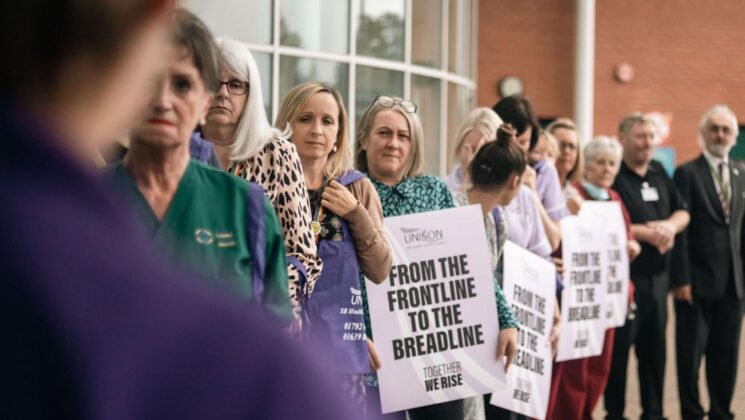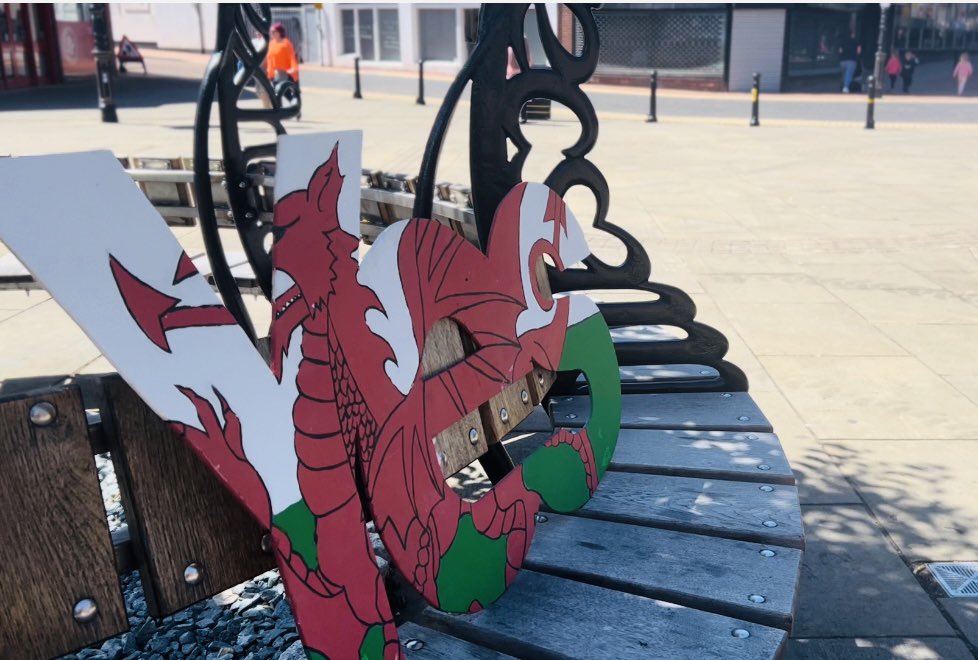
“We Are At War”: Thousands of Workers in Wales Forced to Skip Meals and Pawn Possessions, UNISON Survey Reveals.
Union survey draws huge response from workers driven to despair by poverty pay.
Cost of living rally held as NHS workers ballot for strike action.
By Ben Jones. Cover image via UNISON Cymru Wales
A heart-breaking survey by UNISON Cymru/Wales, which represents tens of thousands of public sector workers, has revealed the devastating impact of the cost-of-living crisis on those providing vital public services.
A huge number of key workers in Wales, 6,067 in total, completed the survey in a matter of weeks.
Over 70% of respondents worked in either health, education or social care, with 1555 from the NHS, 1445 from schools and 1148 from social care taking part.
They revealed the financial pain so many key workers are going through – with 1,773 respondents saying that the crisis had had a ‘significant’ effect on their mental health and 2,025 saying that they are unable to concentrate on their work due to worrying about their finances.
Over 45% of workers said they had seen their monthly outgoings increase by up to £300, and 28% have seen them jump up to £400. These additional costs easily wipe out the so-called pay rises handed down to local government and NHS workers this year.
But the survey also revealed the devastating impact this is having on workers’ lives. 404 people had pawned possessions to survive while 1,025 had gone without meals and 274 workers had used a food bank.
Three quarters of respondents said they had stopped seeing friends as much due to financial pressures, whereas 58% – 3,552 people – said that they were unable to afford a holiday this year, despite working in vital frontline services.
One key feature of the survey was the struggle being faced by teaching assistants and other school workers, who typically earn around as little as £20,000 per year.
“I’m a teaching assistant working full time,” one wrote, “I also work a lunchtime which means no lunch break just to bump up my money. I finish work then go to an after school cleaning job just to make ends meet. The pay for what we do is a disgrace”
Other testimonies show the stress workers are under.
“I worry about not being able to support my daughter in University,” said one worker. “I love my job, but I can’t afford to work as a teaching assistant for much longer unless we get a pay rise.”
“It’s hard not to feel anxious about the uncertainty, and also depression – about not being able to fund fun things,” wrote another.
One simply said: “I don’t sleep, I worry all the time,”
Vanessa, a kitchen assistant in a school in Torfaen, told the union that she would struggle to continue supporting her disabled son.
“His gas and electric have gone up from £85pm to £185pm and he’s asked me when he should put the heating on,” she said.
“I am worrying how I will keep subsidising him on the money I earn. It’s not feasible. If it wasn’t for Universal Credit, I wouldn’t be able to live in my flat, but I am contemplating moving in with him.”
“The government doesn’t understand the cost-of-living crisis. They don’t seem to care and are deceitful. It is heart-breaking to see my son in this position.”
Cost of living rally
Last Thursday evening, following the publication of the survey, the union held a cost of living rally in central Cardiff with the Wales TUC. The meeting was addressed by the new regional secretary for Wales, Dominic Macaskill, Laura Pidcock from the People’s Assembly, UNISON Vice President Libby Nolan, Shavanah Taj, General Secretary for Wales TUC, Brendon Kelly, RMT’s Regional Organiser for Wales & South East and Beth Winter MP.
Testimonials were heard from workers both in attendance and not, including public sector worker and UNISON member Pat Jones, who received a standing ovation, explaining what the cost of living crisis meant to her over video: being afraid of the letterbox opening, texts and emails from her energy supplier: “It means blankets on the bed, and indoor coats. Skipping meals so that the Grandchildren can eat. At least as a member of UNISON, I know that someone cares.”
“We are facing the most right wing government in our history, where the rich minority serve themselves” said Beth Winter. “It’ll cost the UK £19 billion in revenue, paid for through cuts to welfare services…We’re at war – if we won’t show our resistance, then we will perish. This is the time to say that we aren’t going to take this anymore.”
There were loud cheers in the room for postal and rail workers in the CWU and RMT unions currently engaged in a series of strikes for fair pay.
Meanwhile, UNISON Cymru Wales have launched an official ballot for strike action in the NHS and will be recommending that its members in the health service vote to walk out over pay.
“Health workers will soon have their say on industrial action after the latest derisory pay offer from Welsh government,” the union said.
“A postal ballot will begin on Thursday October 27 and close on Friday November 25 at 10am.”
Other unions in health including Unite, the GMB and the Royal College of Nursing are also balloting for strike action. If votes are successful, walkouts could be held at the end of 2022 or the beginning of 2023 in what would be an historic strike in the Welsh NHS.



1 Comment
Comments are closed.